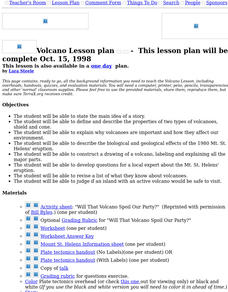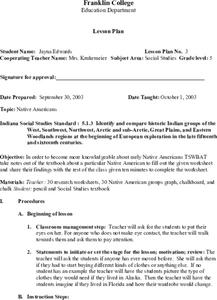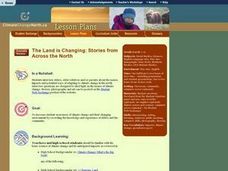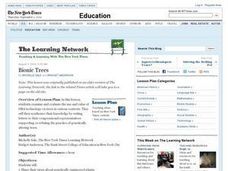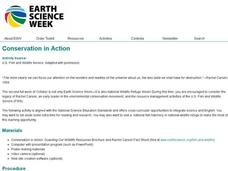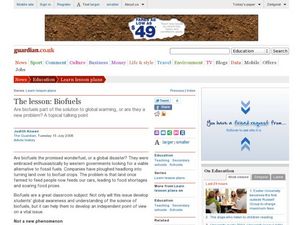Curated OER
Volcano Lesson Plan
Students describe the properties of volcanoes, and explain why volcanoes are important to the environment.
Curated OER
Let it Grow!
Students explain the relationship of plants and animals in the environment. They name the basic requirements for plant growth and define the terms photosynthesis, stomata, chlorophyll and xylem.
Curated OER
Beneficial Bug Scavenger Hunt
Students identify several beneficial insects and spiders, including predators and pollinators. They search an outdoor environment and record numbers and types of beneficial insects and spiders that they discover.
Curated OER
Earth Kids: Kindergarteners Taking Care of the Earth
Students explore a variety of ways of how to care for the environment in the nine lessons of this unit. They observe how to be responsible "Earth Kids."
Curated OER
Life's Greatest Miracle
Young scholars study/identify the effects of maternal consumption of alcohol at various stages of pregnancy. They study how a developing embryo needs a certain environment to evolve into a healthy fetus and healthy baby. They use the...
Curated OER
Creating an Experimental Design
Young scholars research the damage to the environment by certain plant species. They create an experimental design which they test how these species take over certain habitats. They share their information with the class.
Curated OER
Native Americans
Fifth graders discover that different Native American groups had different ways of living because of their environment. They discuss with the teacher to learn that different environments have different food choices. They then research a...
Curated OER
The Land is Changing: Stories from Across the North
Students explore the changing environment in their community. They interview elders about the issues, impacts and potential ways of adapting to climate change in the north. Students post pictures and information on the student...
Curated OER
Bionic Trees
Students examine the debate about using trees to clean up the environment by reading and discussing a news article. They research the various contexts for which scientists may want to genetically alter trees and assess the validity of...
Curated OER
Floor Plans
Students in a college classroom are introduced to the importance of floor plans in their child care center. After watching a PowerPoint presentation, they design their own floor plan and identify problems with ones they are shown. To end...
Curated OER
Teaching the Five Themes of Geography Through Picture Books
Read the story Make Way for Ducklings and introduce little ones to the five themes of geography. Reread the story, while displaying transparencies to reinforce the five themes. In groups, learners view pictures and identify the themes on...
Curated OER
Global Eyes
Twelfth graders consider global issues and their effects. They identify the themes of human needs, human rights, and the environment, select a topic and research articles for a Global Current Events Portfolio. Working in small groups,...
Curated OER
Clearcutting: Sustainable Forestry?
Learners explore the conflicts between the economy and the environment by focusing on forest management in Maine. They read pamphlets on siliviculture and clear-cutting as well as those by environmental groups then conduct a debate on...
Curated OER
Creepy Crawlies
Second graders study the world of insects. They join Greenpatch Kids, an organization of young people who are interested in nature and want to protect our environment. In addition, the students assess use of technology as a valuable...
Curated OER
Best Design of a Floor Plan
Students participate in this continuation of the Design Your Space lesson. Using their completed classroom floor plans, students discuss the pros and cons of each floor plan and select the plan which has the best use of space and...
Curated OER
Ecosystem Worksheet
For this environment worksheet, students find the words that are related to the ecosystem. The vocabulary is used to help develop environmental awareness.
Curated OER
Summer Machines Activity: Cool Tools
Students examine and think about various tools in their surrounding environment to facilitate development of their primary observation and sorting skills. In this tool observation instructional activity, students first sort a variety of...
Curated OER
Treacherous Trash
Learners recognize the harmful effects people have on the environment. For this environmental lesson, students simulate water pollution clean-up by using tangled objects and untangling them in a cooperative group. Learners identify why...
Curated OER
It's All in the Rings
Students examine how the environment influences tree growth. In this tree instructional activity, students analyze the growth of rings to see how plants adjust to adverse conditions in order to survive.
Curated OER
Management of Commercial Fisheries, Part 2
Students examine the differences between the past vs. the present fishing and the uses of fisheries. In this investigative instructional activity students complete a worksheet and learn to think critically in order to protect our...
Curated OER
Burs in Your Furs
Students explore the concept of animal welfare. In this wild animal habitats lesson, students discover the work of wild animals in sustaining their habitats as they participate in a classroom simulation. Students discuss how wildlife...
Curated OER
Why Are Thinning Trees Important?
Young scholars investigate thinning trees and why they are important to the forest. In this sustainable environment lesson, students role-play as if they are trees in the forest and simulate the overcrowding and inability to move...
Curated OER
Conservation in Action
Young scholars research the life and works of Rachel Carson. In this conservation lesson, students discuss environmental protection and why protection of wildlife is important. Young scholars read a Rachel Carson Fact Sheet and work in...
Curated OER
The Lesson: Bio-fuels
Students explore the pros and cons of bio-fuel use. In this environmental stewardship lesson, students visit selected websites to discover what bio-fuels are and the effect they may have on the environment.


